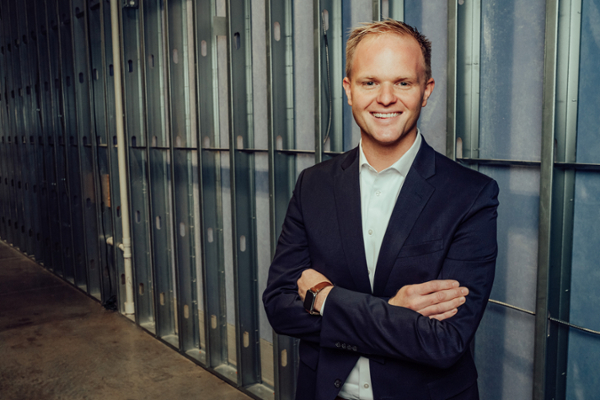Published on November 29, 2021 by Morgan Black

Brent Fielder ’08, M.B.A. ’19, was among the first cohort of students to be a part of the social entrepreneurship and nonprofit management program in Samford University’s Brock School of Business. As a complement to his management major, this foundational program equipped him to begin his career in a nonprofit management role upon graduation.
Now, Fielder is the enterprise philanthropic ambassador and director of CSR and Strategic Communications for Chick-fil-A’s corporate office and has been named a new member of the Samford University Board of Trustees. In this role, he hopes to help steward the mission of the university while also bringing fresh perspectives to the board.
How did Brock School of Business prepare you for your career?
Samford’s Motto “For God. For Learning. Forever.” was really important to me in that season of my life. Your college years are when your faith becomes your own and you decide what you want to do with your life. For me at that time, I decided to trust God with my life. I spent a lot of my time in undergrad wondering if I should go into full-time ministry or full-time business. I knew He had wired me to love business, and Samford was pivotal at helping me understand how I could integrate my faith in the marketplace.
Not only did Samford help me realize living out my faith in the marketplace could be my greatest impact, but I received a top tier education. Samford was really challenging for me as an undergrad student. When I would see my peers skip class, I wondered “how in the world are you skipping class…I can’t skip class; I’ve got to be in class because it was very challenging—in a good way.”
What relationships formed at Samford do you look back on as you think about your career preparation?
The relationships I formed with faculty helped shape my career. For one, Dr. [Betsy] Holloway had a huge impact on me. She was a thought leader; she understood the discipline and taught it well. Beyond that, she was a great mentor and helped us understand how what we were learning would apply in the real world. It didn’t feel like just theory from her, which made me love her class.
The relationships with my peers were also impactful. I still talk with my good friends regularly. There are three of us who now have family business in common and we connect about that from time to time.
As an alumnus, why is it important for you to stay involved with Samford?
We’re at a really interesting time in culture where the world genuinely needs a place like Samford—a place deeply committed to its Christian faith, deeply committed to academic rigor, and deeply committed to reconciling those two things in our culture that we live in. For me, I stay involved to play just a tiny part of that so we stay true to our motto—all about God, all about learning—and to help shape culture. But, also, to hopefully continue being a voice of people who care about this university while cheerleading Samford on to do those things. With all the challenges in our world today, we need institutions like Samford to continue to thrive. Samford is one of the few institutions I accredit my maturity and spiritual growth to. When I look back at successful moments in life, Samford is one of the pivotal markers that contributed to those moments. I want to give back to a place that shaped me so much.
What advice do you have for current students as they pursue careers in today’s business climate?
Business as an institution has an opportunity to really shape our culture. If you’re a business student, being able to really understand your faith and how you apply your faith in the marketplace might give you more opportunity to influence culture than ever before. Also, in our digital world, I encourage you to not lose track of personal touch points. Old tricks, like showing up to meetings and hand-written notes, will take you a long way. Today’s students must figure out how to integrate the two worlds.
How does Brock School of Business’ approach to developing ethical, Christian business leaders mirror Chick-fil-A’s business model?
Chick-fil-A was founded on biblical principles. Our founder, Truett, often said he saw no conflict between biblical principles and good business practices. I would say a lot of what I learned at Samford mirrors that. Samford does a phenomenal job at teaching the core business disciplines, but every class I had in Brock School of Business integrated my faith as well. So, everything I learned at Samford truly influences what I get to do in my career.
Located in the Homewood suburb of Birmingham, Alabama, Samford is a leading Christian university offering undergraduate programs grounded in the liberal arts with an array of nationally recognized graduate and professional schools. Founded in 1841, Samford enrolls 6,324 students from 44 states, Puerto Rico and 16 countries in its 10 academic schools: arts, arts and sciences, business, divinity, education, health professions, law, nursing, pharmacy and public health. Samford is widely recognized as having one of the most beautiful campuses in America, featuring rolling hills, meticulously maintained grounds and Georgian-Colonial architecture. Samford fields 17 athletic teams that compete in the tradition-rich Southern Conference and boasts one of the highest scores in the nation for its 97% Graduation Success Rate among all NCAA Division I schools.

